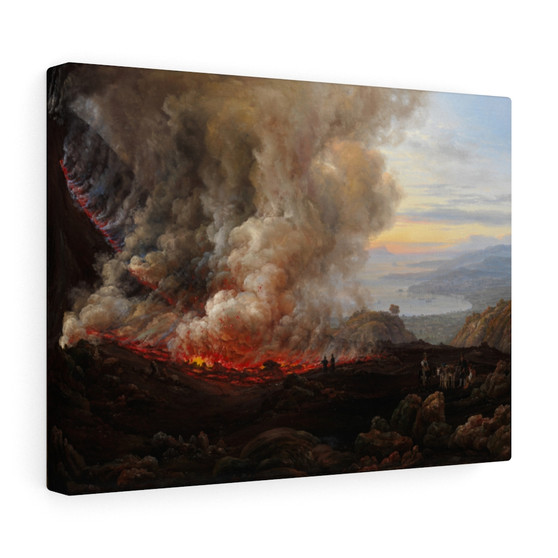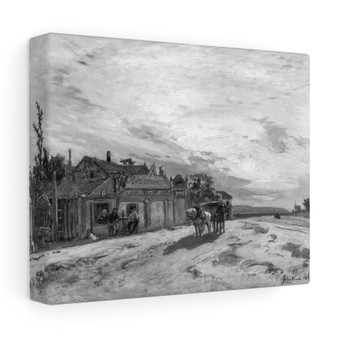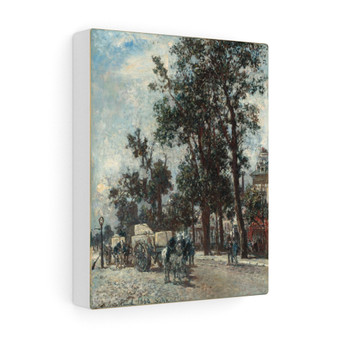Product Description
An Eruption of Vesuvius, 1824, Johan Christian Dahl. Historical artwork in public domain. Paintings by masters from the golden age of classical art. Dahl visited Vesuvius just before Christmas 1820, to witness its eruptions at close-hand. He immediately made an oil sketch (Statens Museum for Kunst, Copenhagen) that served as the basis for the present work, completed four years later for Prince Christian Frederik, later King Christian VIII of Denmark. Vesuvius had attracted artists and Grand Tourists alike since the rediscovery of Pompeii in the mid-eighteenth century, offering a vision of the Sublime that served as a counterpoint to the austerity of Neoclassicism. Title: An Eruption of Vesuvius Artist: Johan Christian Dahl (Norwegian, Bergen 1788–1857 Dresden) Date: 1824 Medium: Oil on canvas Inscription: Signed and dated (lower right): Dahl d. 24 Decbr 1824 References on the original Fortnegnelse over Hans Kongelige Höihed Prinds Christian Frederiks Malerisamling; . . . övet Kunsten I Danmark [Register of the Art Collection of Prince Christian Frederik, later Christian VIII]. n.d., no. 49 [ms. in Danish National Archives, Copenhagen; see Bang 1987], gives the date of the commission as 1821. T. "Dresden, Die lezte [sic] Kunst-Ausstellung." Hesperus (1824), p. 862 [see Bang 1987]. Johan Christian Dahl. Letter to Christoffer Wilhelm Eckersberg. March 24, 1824 [see Bang 1987], states that he will probably complete it in the summer. Prince Christian Frederik. Letter to Johan Christian Dahl. July 31, 1824 [excerpt trans. in Bang 1987], expresses pleasure that the artist was working on a painting of Vesuvius for him, which “cannot fail to impress”. Johan Christian Dahl. Diary entry. January 1825 [see Bang 1987], mentions letter from G. E. Harzen about the arrival of the painting in Copenhagen. Prince Christian Frederik. Letter to Johan Christian Dahl. January 22, 1825 [quoted in Aubert 1920; trans. Ormhaug 2018], writes “I have received the most beautiful adornment to my collection in the form of your incomparable painting depicting the glowing lava flow on Vesuvius and the view from that mountain of Naples and the beautiful bay. Painters admire your bold and confident brushwork. Everyone who sees this magnificent painting is astonished and delighted with its effect, in addition to which I admire the great veracity of the depiction . . . . ”. Johan Christian Dahl. Einnahmen für die Jahre 1824–1855. January 22, 1825 [Universitetsbiblioteket, Oslo, Ms. Fol. 1882k; excerpt published in English transl. in Bang 1987], notes “From Thomsen for Vesuvius – P. C. 245 Rd.,” referring to payment for this painting. Johan Christian Dahl. Diary entry. January 29, 1825 [see Bang 1987], mentions letter from Crown Prince Christian Frederik expressing delight about it. Carl Reitzel. Fortegnelse over Danske Kunstneres Arbejder paa de ved det Kgl. Akademi for de Skjønne Kunster i Aarene 1807–1882 afholdte Charlottenborg-Udstillinger. Copenhagen, 1883, p. 106. Friedrich von Boetticher. Malerwerke des neunzehnten Jahrhunderts. Vol. 1, Dresden, 1891, p. 210, no. 10 [reprint, 1974]. Andreas Aubert. Maleren Johan Christian Dahl; et stykke av forrige aarhundredes kunst- og kulturhistorie. Kristiania [Oslo], 1920, pp. 134, 442. Pontus Grate et al. Dahls Dresden. Exh. cat., Nasjonalgalleriet. Oslo, 1980, p. 82, no. 69, as “Vesuv i utbrudd”. Pontus Grate et al. Romantiken i Dresden: Caspar David Friedrich och hans samtida 1800–1850. Exh. cat., Nationalmuseum. Stockholm, [1980], p. 50, no. 31. Dyveke Helsted. "Christian VIII: An Intelligent Amateur." Apollo 120 (December 1984), p. 421, fig. 6. Marie Lødrup Bang. Johan Christian Dahl, 1788–1857: Life and Works. Oslo, 1987, vol. 1, pp. 169, 176; vol. 2, pp. 14, 110 (under no. 257), 118 (under no. 296), 122 (under no. 316), 157–58, 174 (under no. 510), 309 (under no. 1032), 359 (under no. 1254), 364 (under no. 1284), no. 451; vol. 3, pl. 182, publishes early manuscript references. Bjarne Jørnæs in Marie Lødrup Bang et al. J. C. Dahl i Italien, 1820–21. Exh. cat., Thorvaldsens Museum. Copenhagen, 1987, p. 81, under no. 42. Magne Malmanger in Johan Christian Dahl, 1788–1857: Jubileumsutstilling, 1988. Exh. cat., Nasjonalgalleriet. Oslo, 1988, pp. 134, 164–65, no. 81, ill. (color). Kasper Monrad. The Golden Age of Danish Painting. Exh. cat., Los Angeles County Museum of Art. New York, 1993, p. 72, under no. 12, in the entry for the painted study in the Statens Museum for Kunst, Copenhagen (Bang 1987, no. 257), notes that Dahl "made a number of replicas" (of which The Met's version is one). Johan Christian Dahl: Kistefos-Museet, Museum og Galleri. Ed. Nina Sørlie. Exh. cat., Kistefos-Museet. Jevnaker, Norway, 2000, p. 146, no. 12, ill. p. 79 and on dust jacket (color, overall and detail). Bodil Sørensen. J. C. Dahl: Tegninger fra Italia-reisen 1820–21. Exh. cat., Nasjonalgalleriet. Oslo, 2004, p. 62, under no. 82. Landet der Sitroner Gror: Johan Christian Dahl, Thomas Fearnley og Johan Gørbitz i Syd-Italia. Ed. Anne Aaserud. Exh. cat., Nordnorsk Kunstmuseum. Tromsø, Norway, 2005, p. 58, under no. 13. Knut Ormhaug in J. C. Dahl: The Power of Nature. Exh. cat., KODE Art Museums and Composer Homes. Bergen, 2018, p. 69. Asher Ethan Miller in Gifts of Art: The Met's 150th Anniversary. New York, 2020, p. 82, ill. (color). Gifts of Art: The Met's 150th Anniversary. New York, 2020, p. 194.
.: Manufacturing regions: UK, EU
.: Printing method: Giclée, Solvent inkjet
.: Lifelong color guarantee
.: 100% cotton fabric
.: Wooden frame
.: High image quality and detail
.: For indoor use
.: Pre-installed hanging hardware
.: Ensures proper locking to walls
Each custom stretched canvas begins with a 12-color Giclée print, produced from a choice of substrates. We then make a custom wooden frame. The canvas is then hand-finished by our experienced framing team, who ensure each corner fold is perfectly smooth and tight.
Designed for indoor use, custom stretched canvas prints are made from treated cotton - providing the smoothest of matte surfaces for exceptional design vividity. A combination of <b>quality and durability</b>, these hangings come with a <b>lifelong color guarantee; there's significant confidence in their withstanding the test of time</b>. On the backside, pre-installed hanging hardware <b>ensures proper locking to walls</b>.
Colors may vary slightly during the printing process.
#styleathome #homedecor #paintingsforhome #classicalart #gift #holidaygift #artlovergift #wallartprint




















